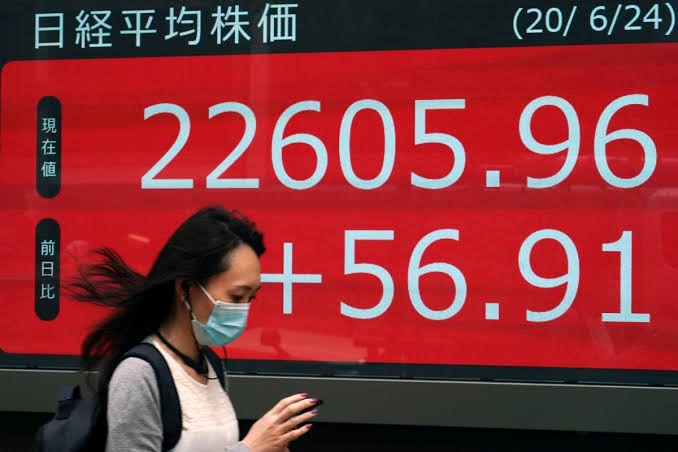Asian share markets began the week with a cautious tone on Monday as the relentless spread of the coronavirus finally made investors question their optimism on the global economy, benefiting safe harbour bonds and crimping oil prices.
SEE ALSO: Saudi King Pushes for Global Action to Coronavirus at Virtual G20 Summit
MSCI’s broadest index of Asia-Pacific shares outside Japan fell 1.3 per cent and further away from a four-month top hit last week.
Japan’s Nikkei shed 2.2 per cent and Chinese blue chips 0.9 per cent.
E-Mini futures for the S&P 500 eased 0.2 per cent, while EUROSTOXX 50 futures lost 0.7 per cent and FTSE futures, 0.9 per cent.
Wall Street had faltered on Friday as some U.S. states reconsidered their reopening plans.
The global death toll from COVID-19 reached half a million people on Sunday, according to a Reuters tally.
About one-quarter of all the deaths so far have been in the U.S., with cases surging in a handful of southern and western states that reopened earlier.
“The increase in the U.S. COVID-19 infection rates has dented momentum across markets despite the improvements in the global economy, which continues to beat most data expectations,’’ wrote analysts at JPMorgan in a note.
“Our strategists remain sanguine and recommend to buy on dips but also selectivity,’’ they added.
“Traditional hedges like JPY vs USD, USD vs EM FX, gold and quality stocks are still outperforming this month.
“We stay overweight the U.S. equities but move EM equities to neutral and stay neutral U.S. credit.’’
Sovereign bonds benefited from the shift to safety with yields on U.S. 10-year notes falling to 0.64 per cent, having briefly been as high as 0.96 per cent early in June.
The U.S. dollar has generally gone in the opposite direction, rising to 97.461 against a basket of currencies from a trough of 95.714 earlier in the month.
It had less luck on Monday, easing back to 107.08 yen, though it remained well within the recent range of 106.06 to 107.63.
The euro stood at $1.1240 having found solid support around $1.1167.
It is an important week for the U.S. data with the ISM manufacturing index on Wednesday and payrolls on Thursday, ahead of the Independence Day holiday.
Federal Reserve Chair, Jerome Powell, is also testifying on Tuesday.
“U.S. economic data will reinforce that the economy is through the worst of the recession in our view,’’ said CBA Currency Analyst, Joseph Capurso.
“But a double‑dip recession is possible if widespread restrictions are reimposed, leading to a surge in the dollar.’’
In commodity markets, gold held near its highest since early 2012 at $1,773 an ounce.
Oil prices slipped amid concerns the pandemic would slow the reopening of some economies and thus hurt demand for fuel.
Brent crude futures fell 83 cents to $40.19 a barrel, while U.S. crude lost 84 cents to $37.65.

